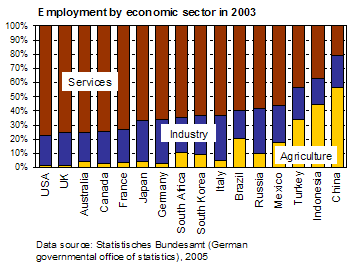Importance of the service economy
Most economies go through three stages of economic development: primary, secondary, and tertiary. The primary stage is driven by labor- and natural resource-intensive agriculture, the secondary by capital-intensive industry, and the tertiary by knowledge-intensive services. The economies of the developed nations have been moving from the primary to secondary and to tertiary economies over the past hundred or so years.
The majority of developed countries’ gross national product (GNP) is already derived from services. And the majority of employees work in services businesses. These service businesses span all industry sectors and range from a one-person laundry service, through medium-size retail outlets, to large IT service companies.
The importance of services in developed economies will continue to grow. The outsourcing of agriculture and manufacturing jobs to developing countries will continue, leading to even higher share of services in the overall economy.
As shown in the graph below, the importance of the service sector is significant in developed countries. And since Germany participates in the global economy, it should ensure that its service offerings and service levels are competitive.




[…] As described in this post, the majority of developed countries’ gross national product is already derived from services and the majority of employees work in service businesses. Hence, the global competitive advantage depends more on services driven by human-to-human interactions than on engineering or product development. And here Germany lacks competitive advantage. […]
update me more on the roles of service in a developed economy